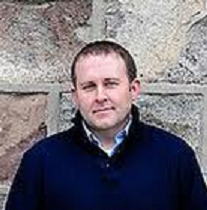By Matthew Woodbury
Trevor Kilgore is an Academic Advisor and Coordinator for Department Advising at the University of Michigan’s College of Literature, Science, and the Arts. He received his PhD in History from the University of Michigan in April 2018.
The University of Michigan offers a dizzying array of academic programs across more than a dozen schools and colleges. As an academic advisor and coordinator of department advising for the Newnan Academic Advising Center, Trevor Kilgore helps undergraduates navigate over 85 majors and more than 100 minors.
During an 8-5 workday, Trevor usually has a series of 30-minute meetings with students to plan coursework, ensure they’re on track to complete their degree, or talk about study abroad and other academic and professional opportunities. In addition to meeting with students, all advisors and staff at Newnan serve on a range of committees. Trevor’s portfolio includes the Professional Development Committee, the Business by LSA Committee, and the Operations Working Group. The latter is tasked with determining how the Advising Center can achieve better advisor wellness and service to students. Also involved with planning college-wide initiatives, like LSA’s Expo for Majors and Minors that brings a thousand students to the Michigan Union to meet with representatives from LSA’s academic programs, Trevor also manages the compilation of Newnan’s newsletter, manages a working group of department advisors that meets monthly, and oversees the Advising Center’s liaison program to LSA departments.
Trevor characterizes advising at Michigan as an additive process that follows each student throughout their time at the university – academic advisors are among the first staff to meet each incoming student and among the last they see before graduation. Each semester has its rhythm; conversations mirror the stresses and priorities of the academic calendar. Questions about adding classes in the first few weeks of a semester segue into concerns about graduation checklists by the end. Each conversation, however, works toward the same focus of helping students explore and achieve their interests through coursework, study abroad, or research opportunities.
Academic advising builds on Trevor’s extensive experience working with students in instructional roles. Teaching sections of a lecture class as a graduate student instructor, offering three seminar-style courses of his own design at Michigan, and teaching European history at Adrian College allowed him to interact with a wide range of students in diverse learning environments. In the same way that his classrooms formed spaces for conversation and deliberation, Trevor’s advising meetings with students are less about what they “should” or “shouldn’t” do and instead prioritize listening, making suggestions, and connecting them with university resources. Skills that Trevor developed through his teaching, including explaining complicated material clearly, presenting alternative ways of thinking about an issue, and working through difficult concepts, also help him counsel students through significant decisions.
Doctoral students know that writing a dissertation requires personal perseverance, juggling competing deadlines and timetables, and navigating institutional requirements. Trevor also emphasizes that that finishing the degree means a successful experience in project management. Balancing long-term and short-term goals, communicating across multiple departments, and maintaining a self-directed work schedule are skills that apply broadly in a range of jobs and working environments.
For current graduate students, Trevor encourages keeping an eye out for opportunities that extend and complement, rather than duplicate, the teaching requirements of many humanities departments. A bit of independent research about the types of jobs that are out there – University of Michigan Careers, InsideHigherEd, and the Versatile PhD are all good places to look – can provide a sense of what skills employers are seeking. Trevor also recommends visiting the websites of relevant professional organizations – the one for academic advising is NACADA – to get more tailored advice from within a profession. Often, like the American Historical Association and American Philosophical Association, there are also targeted resources for doctoral students pursuing non-tenure track opportunities. Finding people in roles that sound interesting and contacting them for an informational interview provides a personal perspective about a specific role or working environment.
Referring to his own trajectory, Trevor found it useful when considering what next step to take to explore the many ways in which people interact with students on campus. Including non-teaching aspects was important to this process. In his research he was impressed to discover the remarkable range of options available to graduate students. Employment, internships, or job shadowing with campus units like the Newnan Academic Advising Center, the Center for Global and Intercultural Study, the Office of Student Conflict Resolution, or SAPAC provide opportunities to work with students in an educational environment outside of the classroom. Though the transition from the autonomy of graduate school to the structured work accompanying a large organization has its challenges, not feeling the pressure to always move forward with a research project and catch up on grading allows Trevor to spend more time with his family.
Following a non-traditional path can often mean the absence of a clear trajectory. In this regard, Trevor sees parallels between humanities doctoral students pursing non-traditional careers and concerns he hears from some undergraduate students in the liberal arts and sciences. One of Trevor’s most memorable advising experiences was working with a student who was choosing whether or not to graduate in a year from UM, which would entail taking classes they didn’t find interesting, or leave UM and begin preparing for a different career at another university. In their discussions they talked through a wide range of options and variables and weighed the pros and cons of each path’s potential. The student decided that the right decision for her was to leave, and Trevor praises her bravery in making that decision – it can be difficult to make a choice. To help explore your options, it helps to have confidence in your skills, take advantage of university resources, and do some research and inquiry about what you find meaningful. Taking a first step is a good place to start.


